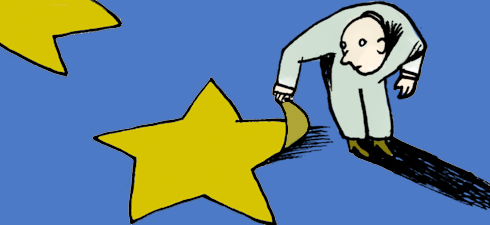Poor words! They are the first victims of our European leaders, who use and abuse them to the point where they are deprived of all meaning. For Germans, “solidarity” has now come to mean “those pesky Southern Europeans who are continually demanding more money.” For the Greeks, “solidarity” means “those pesky Germans who are continually demanding more sacrifices.” For certain political actors, “federalism” is an empty shell you flaunt if you want to appear modern; for others it is an empty shell you brandish if you want to inspire fear.
Hardly anyone acknowledges the original meaning of “federalism” as support for a decentralised democracy. Sarkozy even used the term as a synonym for the intergovernmental system that is its precise opposite. And when we run short of words, we can always demand “more Europe”, an expression that means absolutely nothing. Perhaps we need more democracy, more integration, or more cohesion – at least we know what these things mean. But more Europe, I have no idea what this is supposed to be.
Just before the summer, “growth” was all the rage. Our euro-chiefs got together for a “summit on growth”, where the socialists led the charge for “growth”. In particular, Hollande warned that he would not sign the new fiscal compact if it was not accompanied by a plan for growth. Then came the announcement that more than 100 billion euros was to be redeployed in projects to support growth and jobs. In just two days the drive for growth had been rewarded with a tenth of the sum that we had lent to banks, but finally…
Dutch rail has dodged taxes
Well they almost had us fooled, didn’t they? A few months later, France is preparing to sign a budgetary treaty, which makes a mockery of the European parliament, establishes unrealistic and even harmful objectives, and introduces a model which has the potential to destroy the European Union for the so-called good of the euro. And what has happened to the growth fund? If the latest rumours from the European Council are to be believed, France is refusing to stump up for its share. All of this is not only sad, it is pathetic. Individual EU countries are toying with the destiny of other member states without realising that their own fate is also hanging in the balance.
The most edifying example of this refusal to acknowledge the obvious is tax evasion. As we all know, virtually every one of the top 20 companies quoted on the Lisbon stock market is domiciled in the Netherlands so as to avoid Portuguese taxes and accounting obligations. The Netherlands turns a deaf ear to complaints from countries, like Portugal, that are the victims of this practice — and, if the truth be told, the countries themselves have done relatively little to address the problem.
However, in the Netherlands, the fact that the Dutch state-owned rail company has dodged taxes by routing a significant portion of its business through Ireland has now emerged as a major issue in the ongoing Dutch election campaign. Suddenly, the entire world of Dutch politics is waxing indignant about a practice that has never troubled the Netherlands when other EU states were the ones to suffer.
Easy to open a bank
And there are even more flagrant examples of this type of indecency. At the other end of Europe, geographically and politically speaking, Cyprus, which is governed by a communist-led coalition, has enacted a special agreement with Russia, which enables Russian oligarchs to escape taxes in their home country and to launder ill-gotten profits.
In Cyprus, it is not only easy to open a bank account, which can be done without giving your name, it is also very easy to open a bank — something that the Russians have been quick to use to their advantage. Of course, the fact that there is a large business in smuggling Russian arms into Syria is simply a fortuitous coincidence.
So is there anything that can be done? The rotating EU presidency could make addressing these issues a priority. Surely it would, were it not for the fact that Cyprus currently has charge of the EU Presidency, and that it will shortly be succeeded by Ireland.
Was this article useful? If so we are delighted!
It is freely available because we believe that the right to free and independent information is essential for democracy. But this right is not guaranteed forever, and independence comes at a cost. We need your support in order to continue publishing independent, multilingual news for all Europeans.
Discover our subscription offers and their exclusive benefits and become a member of our community now!












